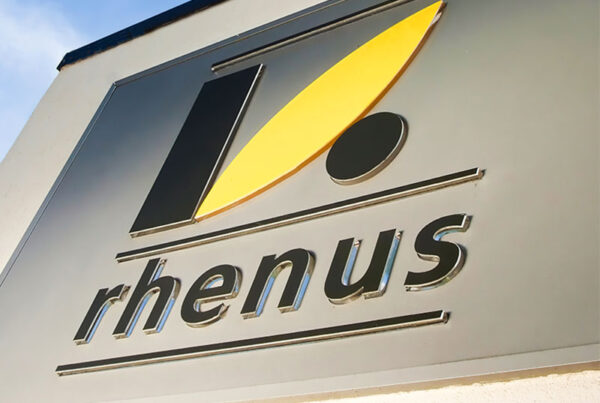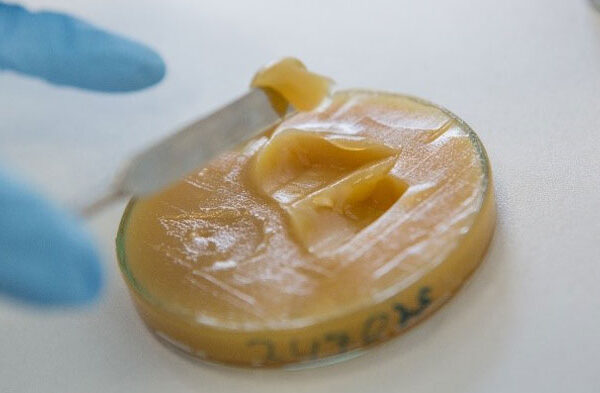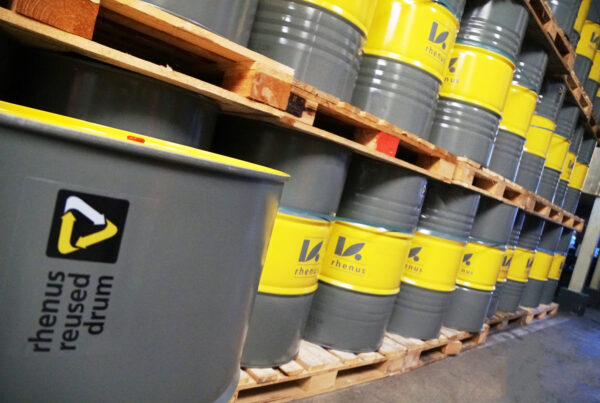The performance optimisers
Reading time: 6 Min. | 22.05.2019
Questions by Erik Schäfer: Lubricating greases and oils determine the performance of machines, systems and engines. What influences lubricant manufacturers? What trends in technology ought to be monitored? K&E also interviewed Dr Carsten Puke (Head of Grease Quality Control R&D) and Dr Marco Pfeiffer (Grease Product Manager and Sales Manager) from lubricant manufacture Rhenus Lub.

Dr. Carsten Puke

Dr. Marco Pfeiffer
Dr Pfeiffer, Dr Puke, there is growing demand for alternatives to lithium-saponified greases. What is driving this and how are you approaching it?
Dr. Pfeiffer: Lithium-based greases are most commonly used in the market. As the demand for lithium batteries in electric cars goes up, so do the prices of the required raw materials. As a consequence, our products must also significantly increase in price. All in all, we recognise the need for cheaper alternatives offering more stable pricing.
Dr. Puke: Our idea is a calcium-saponified lubricating grease. Calcium-based greases are nothing new, but their performance previously fell short of that of comparable lithium-based greases. This is exactly what we have developed: a specially formulated multi-purpose calcium-based grease that is competitively priced, and its performance matches that of a multi-purpose lithium-based grease. One of the key advantages compared to standard calcium-based greases is the upper operating temperature of up to 130 degrees Celsius which we have tested and proven in the lab.
Dr. Pfeiffer: There is a demand for this formulation on the market and it is growing.
“This is exactly what we have developed: a specially formulated multi-purpose calcium-based grease that is competitively priced, and its performance matches that of a multi-purpose lithium-based grease.“
Dr. Carsten Puke, Head of Grease Quality Control R&D
What speciality products do you offer in mechanical engineering?
Dr. Pfeiffer: Besides our large standard range of products, there are customised products that are tailored to specific customers and applications, as well as for mechanical engineering, of course. One example is applications in the area of mining. The different temperatures as well as varying and, in part, shock load conditions place very high demands on the applied lubricating greases. We offer products that efficiently counter these extreme external factors. In addition, we offer speciality products for other application areas such as paper machines, generators and electric engines.
Dr. Puke: Another exciting product is our hybrid grease which was designed for load-bearing pelletisation systems. Although we are aware that certain types of thickener cannot actually be combined, we are always looking for new ways to combine the best elements of different thickeners. This combination allows us to create synergies which enhance performance considerably and contribute towards making the operation of the user’s systems more economical.
What is Rhenus Lub currently working on? Where are you seeing new trends?
Dr. Pfeiffer: Electromobility is a trend placing new demands on lubricating greases. In this context, lubricating greases are sometimes exposed to much higher temperatures than in a combustion engine.
Dr. Puke: We generally rely on special base oils in this regard which stand up to very high speeds and operating temperatures. When it comes to continuous temperatures of up to 160 degrees, you need components that do not evaporate quickly. We are developing new concepts in this area. Polycarbamide greases come into play here because they withstand higher temperatures and open up new possibilities for us. We observe the provisions of the REACH chemical regulation. Last year, we also commissioned a testing machine so that we could actively explore evaporation loss. There is an urgent need for this.
Dr. Pfeiffer: It goes without saying that we improve and develop existing products on a continuous basis. It is often about extending the service life, i.e. longer operating periods and greater re-lubrication intervals. This also includes a sustainable and resource-conserving working method as well as reducing friction and noise. We make products that are specially designed for these requirements.
“It is often about extending the service life, i.e. longer operating periods and greater re-lubrication intervals. This also includes a sustainable and resource-conserving working method as well as reducing friction and noise.“
Dr. Marco Pfeiffer, Grease Product Manager and Sales Manager
What (extreme) requirements typically apply to lifetime lubrication greases for roller bearings, gears or joints? What developments are there in this area?
Dr. Pfeiffer: We generally have to deal with increasing requirements. For example, trailer manufacturers want to promise their customers a design that has the longest service life possible with the lowest amount of maintenance. As the supplier, we have to deliver the right grease, for example a product that can remain in place for more than five years or for more than a million kilometres in a trailer or lorry axle. This also applies to other applications in steel and rolling mills, the construction machinery sector or mining.
Dr. Puke: Or window regulators in the automotive segment, to name a filigree example. These components are produced by the millions. If a lubricating grease, and we are only talking about two grams per regulator, only lasts two years instead of ten, the necessary recall would be a serious cost factor for the window regulator producer. Aspects such as material compatibility also play an important role. Is the grease compatible with PU materials? Before each application, we not only test the performance but also the compatibility and thus increase the level of security.
Lubricating grease as a design element: how do you go about finding the right product?
Dr. Puke: My many years of professional experience have shown me that personal contact is extremely important in the selection or development of the right product. We do, of course, have internal tools to quickly select a product from the existing range. But this is only ever a pre-selection. The product specification is not a true reflection of the real world and you cannot always be sure that it will work when applied. Dialogue is the best way to find out what the customer actually needs, in both the technical consultation and research and development. This is the only way to adequately outline complex interrelations for customised solutions. We are known for asking questions so that we can jointly tackle the problem at hand little by little. This builds a relationship with our customers.
Dr. Pfeiffer: We advise our customers on the correct use of the product and offer customer training. This is beneficial in cases where people have little experience with lubricants, or a team has recently been put together and needs ideas for potential areas of use.
What role do biodegradable lubricating greases play?
Dr. Pfeiffer: Biodegradable lubricating greases already play a key role and will become more important in future. At Rhenus Lub, we make top-performing and biodegradable lubricating greases that can be used for tracks and railways, for example.
Dr. Puke: We follow a comprehensive process when developing sustainable products. Besides the quality of raw materials, we also deal with alternative raw materials so that we are optimally positioned for our customers in future. In doing so, we keep an eye on environmental standards and raw material shortages. This is particularly important for products that have a long life cycle. Will components still be available in the same quality in fifteen or twenty years? We have the advantage that we have stable, resilient relationships and can respond to changes in raw materials without setbacks in quality.
What is the ratio between standard lubricating greases and individually formulated lubricating greases?
Dr. Puke: We cover a very broad application range with our standard products that are very efficient. This makes up about 40 per cent. Customised products are products that have been specifically tailored to customer applications. In terms of quantity, this accounts for 15 to 20 per cent, and this is increasing. However, not every product can be clearly assigned to a category. If it is not a standard product but can still be used for a number of different customers, then we count it among our speciality products. This makes up for around 40 per cent. In future, we want to focus more intensively on speciality products and continue to expand our leading role as a reliable development partner of the industry.
Dr. Pfeiffer: Whether customers want standard or speciality products also depends on the development time. It can take up to three years before a product is ready for the market, i.e. from development and field tests until approval. Not every customer wants this, which is why they might opt for standard products. Greases for the food industry are an important area of speciality products and a growing market. We are well positioned in this regard and have the necessary authorisations. In addition to NSF, H1, halal and kosher, we are certified in accordance with ISO 21469, the hygiene regulation for the production of lubricating greases for food production. This diligence allows us to guarantee adequate quality and product safety.
Published in K&E – Konstruktion und Entwicklung, Edition 5/2019











